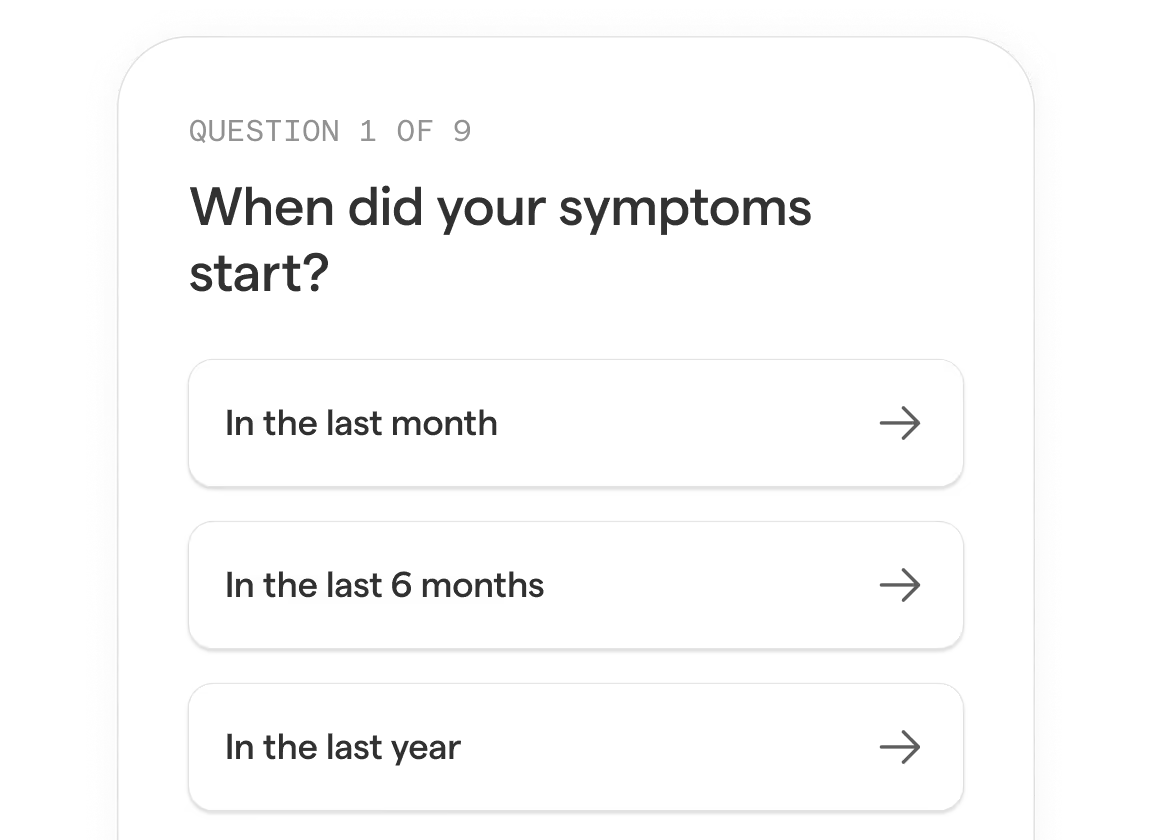Download the Felix App
Earn reward, visit our shop and get exclusive offers on the app
Download now

Through Felix, you can get Semaglutide prescribed by a licensed healthcare practitioner with free delivery to your door.
Semaglutide belongs to the glucagon-like peptide-1 (GLP-1) receptor agonist family of medications. It goes by two different brand names. One form of this drug, Ozempic, is authorized for sale by Health Canada to manage type 2 diabetes while its counterpart, Wegovy, is indicated for long-term weight management. Both use the same semaglutide compound and work the same way on the body.
For more resources, including a full list of the risks and benefits of semaglutide, please review the product monograph.
Semaglutide acts as a GLP-1 receptor agonist that binds to and activates GLP-1 receptors.
GLP-1 helps the body better regulate blood sugar levels. It does this by mimicking natural hormones secreted from the pancreas that control blood sugar production. It also regulates appetite and caloric intake, and the GLP-1 receptor is present in several areas of the brain involved in appetite regulation. It's similar to the natural GLP-1 hormone that our intestines release after a meal.
This means that semaglutide works by causing you to feel fuller and less hungry.
In combination with positive diet changes, and regular exercise, this can help with weight management.
Under the brand name Ozempic, semaglutide is used to manage type 2 diabetes. Under the brand name Wegovy, it is used for chronic weight management, alongside a reduced calorie diet and regular exercise, in patients with a BMI of 30 or higher.
In some cases, it’s also used for patients with a BMI between 27 and 30 when they’re experiencing weight-related health issues.
Semaglutide injection is taken subcutaneously (under the skin), once per week. The injector comes pre-filled and ready for use.
The best places to use semaglutide injection is on the front of the thighs, the front of the abdomen (stomach), or the upper arms.
If you have any questions about how to use semaglutide, be sure to ask your healthcare practitioner at Felix during your online assessment.
The most common side effects of taking semaglutide include:
If any of these side effects start to become serious, you should speak to your Felix healthcare practitioner about it. They’ll be able to suggest potential alternative dosages or medications that may work better for you.
There are a number of people who should be cautious about taking semaglutide, such as:
If you fall into any of these categories, be sure that your Felix healthcare practitioner is aware of these conditions, prior to requesting an online semaglutide prescription.
When someone starts semaglutide in Canada, the typical starting dosage they’ll receive is 0.25 mg.
Over time, a patient (under the guidance of their practitioner) may gradually increase their dose up to a maximum of 2.4mg, depending on each person’s individual response to the medication.
Further reading








Yes, you can get semaglutide online, but in Canada, you must first get a prescription from a licensed healthcare practitioner, like the ones you’ll find at Felix.
If your healthcare practitioner thinks that semaglutide treatments are the right option for you, they may prescribe this treatment. Through Felix, you can then have your medication shipped directly to your door - for free!
No, there’s no reason that you need to wait weeks for an appointment or spend hours of your day sitting around a packed doctor’s office to get semaglutide.
With Felix, you can simply complete an online assessment with one of our healthcare practitioners. If they determine semaglutide is right for you, they can write you a prescription and have it shipped right to your home.
No, semaglutide is not available as an over-the-counter medication in Canada. In order to access semaglutide, you’ll need a prescription from a licensed healthcare practitioner.
Thankfully, Felix makes requesting online semaglutide prescriptions a seamless process. Just complete an assessment with a healthcare practitioner, and if they think semaglutide is right for you, they can provide you with a prescription.
This is a question that’s best asked to your insurance provider, because it really depends on who your insurer is and what your benefit coverage package offers.
The good news is that if semaglutide is covered by your insurance company, Felix can bill your insurer directly, have the prescription filled for you, and then delivered to your home at no additional cost.
It's important to note that insurance coverage for online medications through Felix doesn't include the cost of your assessment.
The only way to get a semaglutide prescription in Canada is through a licensed healthcare practitioner.
Thankfully, Felix’s experts can provide semaglutide prescriptions online, if they believe it’s an appropriate treatment option for you; based on your current health and medical history.
In Canada, you can’t buy semaglutide online without a prescription from a healthcare practitioner, like the ones at Felix.
To discuss the option of starting semaglutide treatments, just complete your online assessment, and if your healthcare practitioner believes it’s a good choice for you, they can write you a prescription.
Best of all, Felix can deliver your medication directly to your home, for free!
Yes, semaglutide is available in Canada by prescription in Alberta, British Columbia, Manitoba, Ontario, Saskatchewan. You can buy semaglutide online through Felix, as long as you have a prescription from a licensed healthcare practitioner.
To talk to a practitioner about whether semaglutide could be right for you, just complete a short assessment with Felix to get started today.
In order to buy semaglutide online in Canada, you must be over the age of 18. You also require a prescription from a licensed healthcare practitioner.
Thankfully, Felix makes this process as convenient and seamless as possible for our patients. Just complete an online assessment, and if the practitioner thinks semaglutide could be right for you, they can provide you with a prescription.
SIDE NOTE: Felix only services patients over the age of 18. If you’re under the age of 18 and you have questions regarding semaglutide, be sure to contact your family physician for more information.
Felix does not compound semaglutide. We only prescribe and dispense semaglutide medications that have been authorized for sale by Health Canada. To learn more about compounded semaglutide, check out this blog.
If you’re interested in requesting an online semaglutide prescription in Canada through Felix, the first thing that you’ll need to do is complete a short online assessment.
It only takes a few minutes to do, and one of our practitioners will get back to you as soon as possible to review their recommendations with you. If they think that semaglutide could be beneficial to your treatment plan, they’ll be able to offer you a prescription for it.
Semaglutide is available as a pill, known as Rybelsus. Felix is currently only offering semaglutide in an injectable form.
If you are seeking a prescription for semaglutide in an injectable form, you can talk to a Felix healthcare practitioner about whether it is the right solution for you.
Felix is Canada’s first truly integrated healthcare platform. We provide on-demand treatment for everyday health needs like weight loss, mental health, sexual health, and more. Founded in 2019, our digital-first approach to healthcare includes everything from diagnosis to prescription — all accessible from the comfort of home.
No. Felix provides a faster, hassle-free way for you to get a treatment plan for certain conditions, but our service does not replace your primary care provider. For matters that extend beyond obtaining a lifestyle treatment safely and easily, we encourage you to consult your primary health practitioner in person — whether for checkups, personal health concerns, or to inform them about your current treatments or treatment plans.
Absolutely. Our online assessments have been designed to ask all the necessary questions required for diagnosis. We've worked with specialists to create an assessment process that can provide sufficient information for the healthcare practitioner to determine whether or not you are eligible for a prescription and craft an appropriate treatment plan.
Call 911 or proceed to your nearest emergency room immediately. Felix is not intended for medical emergencies. Once the emergency has been addressed or resolved, contact your prescribing practitioner to inform them of your experience as this may impact your current treatment plan.
Anyone who is 18 years or older (16 or older for acne and birth control prescriptions), and is located in Alberta, British Columbia, Manitoba, Newfoundland and Labrador, Nova Scotia, Prince Edward Island, Saskatchewan or Ontario. We cannot ship treatments outside of these provinces at this time.
After creating an account, you will complete a medical assessment for evaluation by one of the Felix healthcare practitioners.
During your assessment, you will have the opportunity to send your practitioner questions via secure messaging.
In most cases, practitioners will complete your assessment with secure messaging alone but sometimes they may determine you require an audio or video visit and/or further diagnostic testing to help determine the best treatment plan for you.
If your practitioner has determined a prescription treatment is appropriate, they will approve your visit and write you a prescription. Our pharmacy will then ship your prescription to your home.
You’ll be able to message your healthcare practitioner if you have questions or want to make changes to your treatment at any time.
No. We use an asynchronous telemedicine model so you can complete your online visit in your own time and we save your progress so you can come back later to finish it.
If you are completing a visit in the mental health or weight loss categories, your healthcare practitioner may require a phone or video call to discuss your medical profile further during the assessment process.
Most assessments do not require a phone or video conversation. Once a prescriber has reviewed the info in your assessment they will respond to you via secure instant messages that you can access within your Felix account.
If you are completing a visit in the mental health or weight loss categories, your healthcare practitioner may require a phone or video call to discuss your medical profile further during the assessment process.
You can expect to receive a response from a healthcare practitioner within 24 hours of submission. If you’ve been waiting longer than this, please reach out to our Patient Support team through the chat bubble in the bottom right corner of your account or our Contact Us page.
No. A visit with a licensed healthcare practitioner is required for all treatments currently provided through Felix’s service.
Not long. After completing your assessment, a practitioner will generally respond within 24 hours, and often much sooner.
Treatment plans will be processed within 2-4 business days of your approval date if there is nothing blocking fulfillment.
All packages usually takes 2-3 business days. You will receive an email with your tracking number once your treatment has been shipped.
Absolutely. All Felix shipments arrive in a nondescript blister package so you can have your treatment shipped wherever makes sense for you as long as there is someone there to sign for it.
A signature upon delivery may be required.
There is currently no cost to have your treatment shipped to you from our Felix Pharmacy network.
Yes, your security is paramount to Felix’s mission. Personal health information provided during your medical assessment is strictly and legally confidential between you and the Felix healthcare practitioner.
Beyond that, all your account information (including the medical assessment, credit card, and shipping information, etc.) is also stored safely and securely. Felix is compliant with all federal and provincial health privacy legislation. It is our duty to protect your data with comprehensive security infrastructure and stringent data policies to ensure it stays private and secure.
Read more on our Privacy Policy.
Yes! In Canada, only a licensed healthcare practitioner can write a prescription, and only a registered pharmacist can fill that prescription. We are supported by leaders in the Canadian pharmacology and specialized medical fields. Felix adheres strictly to all the regulations set forth by all applicable Colleges of Pharmacists and Colleges of Physicians and Surgeons in which we operate.
Absolutely. All prescriptions obtained via Felix are provided by licensed Canadian healthcare practitioners—the same as you would get at a hospital, doctor’s office, or clinic. These practitioners do not provide prescriptions unless they deem it medically safe and appropriate to write them based on your medical profile and assessment answers. Our assessments have been crafted by the practitioners on our medical team. Finally, all Felix Pharmacies are provincially accredited just like any retail pharmacy.
Your privacy is our top priority. All your data is 256 bit SSL/TLS encrypted, and we take significant steps to keep your data secure. You can read our Privacy Policy for more information.
Felix charges a fee for the online visit. In most cases the fee is $40 but varies by treatment category. The visit fee includes a prescription valid for up to a year (depending on the condition) and on-going support from the healthcare practitioner or pharmacist.
It depends. Treatment costs vary but will be in line with what you would pay at a pharmacy in person. You will see the estimated cost of your treatment before insurance, during the online visit but will only be billed for medication costs for your prescription once it is approved and sent to our pharmacy. Once approved, your treatment and payment will be processed within one to two days.
Keep in mind that you won’t necessarily need to pay the full price yourself. If you have insurance, Felix’s partner pharmacies will bill your insurer directly. You may also be eligible for financial support in your province.
We accept all major credit cards for any aspect of your treatment not covered by insurance or other financial support
Treatment coverage varies greatly between different insurance plans.
The good news is that if you are covered, Felix can bill your insurer directly, and then process your treatment plan at no additional cost to you. We recommend that you upload your private and/or provincial benefit card during the online visit so that our pharmacy partner can apply any coverage you are eligible for before processing your treatment plan.
Insurance coverage for treatment plans through Felix doesn't include the cost of your visit.
A Felix online visit is considered asynchronous since it is conveniently completed through a secure chat bases system. Currently, asynchronous visits are not covered by insurance or provincial health plans so you will be charged a visit fee, depending on the category of treatment you are requesting.
Medication coverage varies greatly between different plans, provinces, and has specific criteria that determine eligibility. For private insurance, we recommend contacting your benefits administrator with your details and the Drug Identification Number (DIN) and the drug name to determine your coverage.
For more details on provincial health plan coverage see below:
Alberta: Learn more about AHCIP here. Search for covered drugs here.
British Columbia: Learn more about MSP here. Search for covered drugs here.
Manitoba: Learn more about MHSIP here. Search for covered drugs here.
Newfoundland and Labrador: Learn more about MCP here. Search for covered drugs here.
Nova Scotia: Learn more about MSI here. Search for covered drugs here.
Ontario: Learn more about OHIP+ here. Search for covered drugs here.
Prince Edward Island: Learn more about Health PEI here. Search for covered drugs here.
Saskatchewan: Learn more about Saskatchewan Health Coverage here. Search for covered drugs here.












